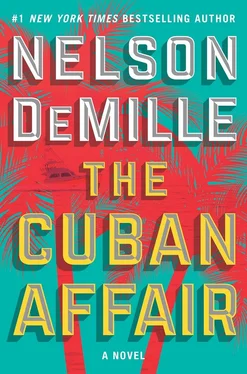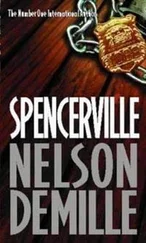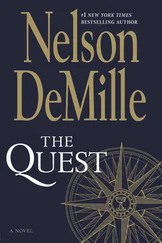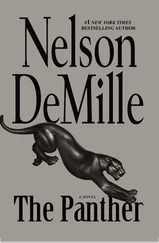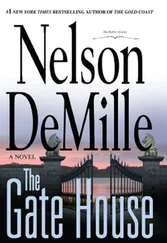“All right.”
“I hope my and Sara’s problems don’t get the group kicked out of the country.”
He seemed distraught.
“I’m going to get some gummy rice. Would you like some?”
He looked at me. “No...” He stood. “I’m sorry about all this.”
“Not your fault. And by the way, Lope is also a chivato and he understands English.”
Tad looked a bit paler. He nodded and went back to his table and sat with Alison. I really didn’t understand why he hadn’t nailed her yet. Maybe he lacked self-confidence.
Sara came into the breakfast room, looking refreshed and pretty in tight white jeans, a blue Polo shirt, and a baseball cap — the same outfit she’d worn when she stepped onto my boat a million years ago. I recalled thinking how great it would be if we had sex.
She sat. “I’m starving.”
“Let’s get some gummy rice.”
“Some... what?”
“Tad asked how we were feeling.”
“Oh.”
I filled her in about my conversation with Tad. I concluded, “Tad is aware that because of your bad attitude toward the regime, you and I may be in the crosshairs of the police.”
“I’m not sure you should have told him that.”
“When we don’t show up for roll call tomorrow morning, he’ll contact the embassy and tell them what I just told him.”
“I like the original plan of leaving him a note saying we went to the beach and we’ll be back in time for the return flight.”
“That’s Plan A. Plan B covers the possibility that we might become guests of the Ministry of the Interior.”
She stayed silent awhile, then said, “You’re either very smart, or... you’re outsmarting yourself.”
“I know the answer to that.”
“You need to consult me before you change the plan.”
“Tactics and strategy need to change in quick response to battlefield realities. That’s why you hired me.”
She nodded.
“Did you leave an envelope for Antonio?”
“I did. My last dollars.”
“I know where there’s more.”
She stood. “Are you getting breakfast?”
“Just bring me some gummy rice. And get some for yourself.”
Sara went to the buffet.
I sipped my coffee. In the civilian world, we say that life is about choices. In the military, we use the word “decisions,” which seem to have more weight, and more consequences, than choices. In the case of choices, the right ones will eventually make you healthy, wealthy, and happy. With decisions, the wrong ones have a way of being instantly unforgiving.
Well, if I was going to die here, it wouldn’t be because I got blindsided by some asshole with a rocket-propelled grenade; it would be because I made a few bad decisions, the first being to let Sara Ortega make bad choices.
And yet... Sara had that one thing that was indispensable for success in life and in battle — self-confidence. And also a belief that God and justice were on her side. So how could I go wrong following her to the end of the rainbow, where sixty million dollars sat in a cave waiting for us? Teamwork makes the dream work.
Sara and I sat in the middle of the bus. José was our driver again, and Antonio hopped aboard with a new spring in his step and six years’ pay in his pocket, with visions of more in his head. Not to mention his date with the insolent and beautiful Sara Ortega. He’d show the Miami Beach Bitch who was boss.
“Today,” said Antonio, “we go to the Forbidden Zone.” He explained, “Vedado means ‘Forbidden Zone,’ and in the old days Vedado was a hunting preserve outside the city walls of Havana, reserved exclusively for the upper classes.”
Who gives a shit?
Antonio prattled on as the bus made its way along the Malecón into the Vedado district. Now and then he would try to make eye contact with me, maybe to assure himself that we had a deal. Or maybe to let me know that when he was fucking Sara, he was also fucking me. He barely looked at Sara. Asshole.
Tad sat quietly and seemed to be still distraught. He glanced at Antonio a few times, seeing him in a different light. Tad had discovered Cuba for himself — and it wasn’t all about the rhumba.
Sara took my hand. “We’re halfway home.”
So was Amelia Earhart.
We drove past the Monument to the Victims of The Maine, and Antonio said, “After the failed Bay of Pigs Invasion, the people of Havana ripped the American eagle from the monument, and there is now a plaque there that reads: ‘To the victims of The Maine, who were sacrificed by imperialist greed in its eagerness to seize the island of Cuba.’ ”
Must be something lost in the translation.
We passed by the Plaza of Dignity, which included the Anti-Imperialist Forum, and this inspired Antonio to go into an anti-imperialist spiel.
Antonio, as I always suspected, was a Commie for convenience, an opportunistic chivato, an enthusiastic scammer, and a full-time amoral pig. I would have no problem putting a bullet in his head.
We drove past the American Embassy and I noticed the Cuban police who were posted outside the gates. Quite possibly they had my and Sara’s names on a list, and our photos from the airport. We weren’t exactly on the lam yet, or on the most wanted list, but if we believed Antonio, we weren’t getting into our embassy — or out of this country — without his help.
“And now,” said Antonio, “on your right you will see the statue of Lenin,” which turned out to be John Lennon, not Vladimir Lenin. The Yalies laughed and Antonio smiled. He was in a good mood this morning.
The bus zigzagged through the streets of Vedado so that we could see and appreciate the accomplishments of Cuban socialism, and we stopped at a memorial to the American Communist spies Julius and Ethel Rosenberg, which I had always wanted to see.
The bus drove through the gates of a huge cemetery, the Necrópolis Cristóbal Colón, a.k.a. Christopher Columbus, which held, said Antonio, over five hundred major mausoleums, chapels, vaults, and galleries, and thousands of tombstones. If I had my Glock, this would be a good place to whack Antonio. Not that it would solve any problems. But it would make me feel good.
“The rich and famous, the colonial aristocrats, the war heroes, the merchants, the artists and writers — they all rest here alongside the martyrs of the revolution,” said Antonio as though he were trying to sell us a plot. “In the end, death is the great equalizer.”
Indeed it is.
The bus continued slowly through the vast marble orchard, past Greco-Roman temples, miniature castles, and mausoleums embellished with cherubs and angels, and even an Egyptian pyramid. It occurred to me that the dead of Havana had better housing than the living.
The bus stopped in a plaza near a Byzantine-styled church, and we all got off.
Antonio gave us his cemetery lecture, peppered with Marxist observations about the extravagance of the rich, even in death. Turns out you can take it with you.
Antonio said, “You may explore on your own. Please be back on the bus in thirty minutes.” He added, “Miss Ortega, I don’t want to come looking for you.” He smiled, and a few of the Yalies laughed.
Sara did not reply to Antonio, but said to me, “I’d actually like to meet him in my room tonight.”
I pictured Antonio in Sara’s bed with the lamp cord wrapped around his nuts and the other end plugged into the socket. I said, “The best revenge is leaving him standing at your door with a deflated ego and an inflated pepino.”
She smiled.
The Yale group separated into smaller groups and began wandering through the cemetery, which was laid out in a grid with wide avenidas, calles, and plazas, the city of the dead.
Читать дальше
